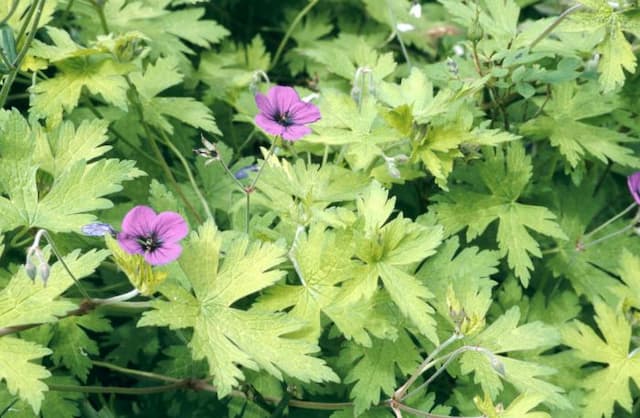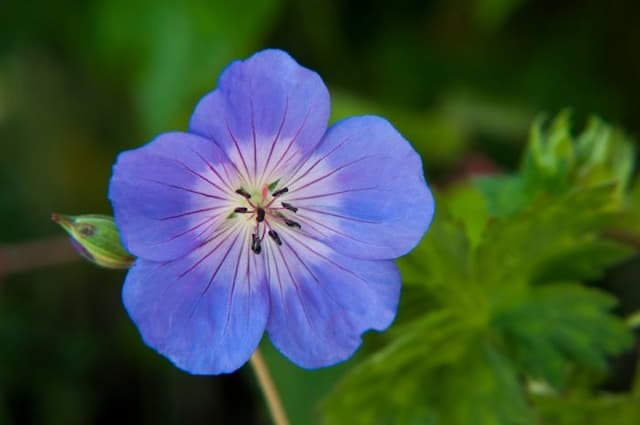Pelargonium 'Sensation Blush' Pelargonium 'Sensation Blush' (Sensation Series)

ABOUT
'Sensation Blush' is a bushy plant to 45cm tall, with rounded, unzoned leaves and clusters of large, single light pink flowers
About this plant
 Names
NamesFamily
Geraniaceae.
Synonyms
Geranium, Zonal Geranium, Garden Geranium, Pelargonium.
Common names
Pelargonium 'Sensation Blush'
 Characteristics
CharacteristicsLife cycle
Perennials
Foliage type
Evergreen
Color of leaves
Green
Flower color
Pink
Height
12-18 inches (30-45 cm)
Spread
12-18 inches (30-45 cm)
Plant type
Herb
Hardiness zones
10
Native area
South Africa
Benefits
 General Benefits
General Benefits- Easy to Grow: The plant is known for being easy to care for, making it suitable for gardeners of all skill levels.
- Attractive Foliage: Features lacy, deeply lobed leaves that add texture to garden beds or containers.
- Long Blooming: Produces flowers for an extended period, often from spring until frost, providing lasting color in the landscape.
- Drought Tolerant: Once established, it has good drought tolerance, requiring less frequent watering compared to other plants.
- Heat Resistant: Can withstand high temperatures, making it ideal for hot and sunny gardens.
- Color Variety: Offers a range of color with its blooms, which can include shades of pink, red, or white.
- Compact Growth: Has a mounding habit, which makes it easy to fit into small spaces or as part of a mixed border.
- Versatile Uses: Suitable for planting in container gardens, hanging baskets, window boxes, or as a bedding plant.
- Pest Resistant: Generally resistant to pests, reducing the need for chemical treatments.
 Medical Properties
Medical PropertiesThis plant is not used for medical purposes.
 Air-purifying Qualities
Air-purifying QualitiesThis plant is not specifically known for air purifying qualities.
 Other Uses
Other Uses- Artistic Inspiration: Due to its striking appearance, Pelargonium 'Sensation Blush' can be used by artists and photographers as a subject in still life paintings or photographic compositions, capturing the delicate gradients of its petals.
- Educational Tool: With its complex hybrid nature, educators can use Pelargonium 'Sensation Blush' to teach students about plant breeding and hybridization techniques in botany classes.
- Culinary Garnish: Its edible flowers can be used to add a splash of color and a mild flavor to salads, desserts, or as an elegant garnish for various dishes and drinks.
- Fragrance Extraction: The leaves of Pelargonium 'Sensation Blush' can be used to extract essential oils for use in homemade potpourri blends or as a natural fragrance for soaps and lotions.
- Symbolic Gift: Representing health and longevity, this variety of geranium can be given as a living gift symbolizing enduring friendship or respect.
- Crafting: Dried flowers and leaves can be incorporated into craft projects, such as in homemade paper or as embellishments for greeting cards and scrapbooking.
- Dye Source: The petals can be used to naturally dye fabrics or paper with soft pink shades, offering an eco-friendly alternative to synthetic dyes.
- Special Events: Can be used in floral arrangements or décor for weddings, baby showers, or other events to create a soft and romantic ambiance.
- Color Therapy: Its soothing color tones can be part of therapy gardens designed to relax and reduce stress among visitors.
- Horticultural Competitions: Gardeners might cultivate this particular geranium for entry into flower shows or horticultural competitions, aiming to showcase its unique features and vie for awards.
Interesting Facts
 Feng Shui
Feng ShuiThe Geranium is not used in Feng Shui practice.
 Zodiac Sign Compitability
Zodiac Sign CompitabilityThe Geranium is not used in astrology practice.
 Plant Symbolism
Plant Symbolism- Comfort and Nurturing: Pelargoniums are often associated with feelings of comfort and maternal care because they are commonly found in home gardens, bringing warmth to the surroundings.
- Healing: With a history of medicinal use, the Pelargonium symbolizes healing and recovery, as it was traditionally used for various ailments.
- Friendship: Often given as gifts between friends, the Pelargonium represents companionship and the value of a long-lasting friendship.
- Good Health: Given their use in folk medicine, these plants also symbolize wish for good health.
 Water
WaterGeraniums, including the Pelargonium 'Sensation Blush', prefer consistent moisture but should not be overwatered. Water them when the soil feels dry to the touch, which typically means watering once every 1 to 2 weeks, depending on the environmental conditions. It's important to water deeply, providing enough water so that it runs out of the drainage holes in the pot, which could be approximately up to a gallon for larger pots during peak summer heat. During the winter months or in cooler climates, the watering frequency should be reduced to prevent root rot. Make sure the pot has good drainage to avoid water sitting at the bottom and causing issues for the roots.
 Light
LightGeraniums thrive best in bright, indirect sunlight. The ideal spot for a Pelargonium 'Sensation Blush' is a location where it can receive at least 4 to 6 hours of sunlight daily, but is protected from the harsh afternoon sun, which can scorch the leaves. East or west-facing windows are often ideal in providing the right amount of light for these plants indoors.
 Temperature
TemperatureGeraniums, including Pelargonium 'Sensation Blush', grow well in temperatures between 65 and 75 degrees Fahrenheit. They can survive minimum temperatures of around 50 degrees Fahrenheit, but should not be exposed to frost. Avoid placing them in areas where temperatures drop below this range. During the hot summer months, ensure they are not subjected to extreme heat over 90 degrees Fahrenheit as this can stress the plant.
 Pruning
PruningPruning geraniums encourages bushy growth and prevents them from becoming leggy. For Pelargonium 'Sensation Blush', remove dead flowers and leaves to promote new growth and improve air circulation. The best time for pruning is in late winter or early spring before the new growth starts. Prune up to one-third of the plant to keep it compact and healthy, and repeat lightly throughout the growing season as necessary.
 Cleaning
CleaningAs needed
 Soil
SoilThe best soil mix for a geranium (Pelargonium 'Sensation Blush') should be well-draining and fertile, with additions of peat, perlite, and compost. A slightly acidic to neutral pH of 6.0 to 7.0 is optimal for healthy growth and flowering.
 Repotting
RepottingGeraniums like Pelargonium 'Sensation Blush' should be repotted annually to refresh the soil and accommodate root growth. Early spring, before the start of the active growing season, is the ideal time for repotting.
 Humidity & Misting
Humidity & MistingGeraniums prefer moderate humidity but can tolerate lower levels without much issue. Aim for a humidity level between 40% to 60% for Pelargonium 'Sensation Blush' for optimal growth.
 Suitable locations
Suitable locationsIndoor
Place in bright, indirect light and avoid overwatering.
Outdoor
Plant in full sun to partial shade; protect from frost.
Hardiness zone
10-11 USDA
 Life cycle
Life cycleThe life cycle of the Pelargonium 'Sensation Blush' (commonly known as a type of Geranium) begins with seed germination, where the plant emerges from seeds and starts to grow with proper soil, light, and water conditions. It then progresses to the vegetative stage, developing roots, leaves, and stems as it establishes itself. As the plant matures, it enters the flowering stage, where it produces pinkish flowers with soft petals, typically in late spring to early summer. Following pollination, which can be facilitated by insects or wind, the plant produces seeds, completing the reproductive cycle. Geraniums can also be propagated asexually through cuttings, where part of the stem is planted to develop a new root system. The plant may continue to flower and grow for several years, with proper care, before it eventually reaches the end of its lifespan and dies.
 Propogation
PropogationPropogation time
Spring-Early Summer
Geraniums, including the Pelargonium 'Sensation Blush', can be propagated most effectively through cuttings. The ideal time to take cuttings is in late summer to early fall. To propagate, select healthy, non-flowering stems and cut a 4 to 6-inch (10 to 15 cm) portion just below a node. Remove the lower leaves, leaving only two or three at the top. Dip the cut end into rooting hormone to encourage root development. Plant the cutting into a pot filled with a mix of peat moss and perlite or sand, then water lightly. Cover the pot with a plastic bag or place it in a propagator to maintain humidity, and keep it in indirect sunlight. Roots typically develop within a few weeks, after which the cutting can be transplanted into a larger pot or its final location.









